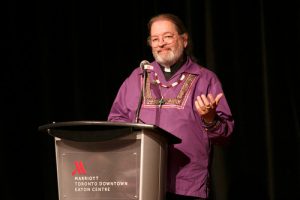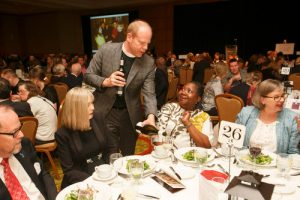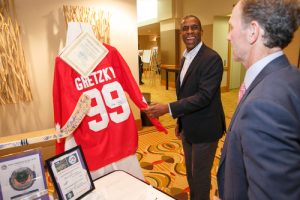By Stuart Mann
Mark MacDonald, the national Indigenous bishop, says Anglicans will need faith, vision and courage to achieve the kind of future they want to have, both in their relations with First Nations people and for the church as a whole.

Bishop MacDonald was the keynote speaker at the 55th annual Bishop’s Company Dinner, held on April 21 in downtown Toronto. The event raised $90,000 to help clergy and their families in need and to provide scholarships for theological students.
“We are being called to a time of faith, vision and courage like nothing you or I have ever seen in our lives,” said Bishop MacDonald, speaking to about 330 guests.
He said Anglicans need to have a faith that gives life to a vision. “We have to believe that God is doing something in this world – that God is not just something to believe in to make us feel better, but that the Gospel of Jesus Christ speaks of a living Word that is active, militant and present in the world.”
That vision includes “seeing things where no one sees them,” he said. He gave examples of how people of deep faith had taken the Gospel to remote and even hostile communities or had recruited unlikely candidates for ministry. He told the story of the Rev. Robert McDonald, a missionary in the Far North who spent nearly four decades working with the Gwich’in people, one of the most fiercely independent First Nations communities in North America.
“He went to that situation and saw something wonderful,” he said. “He believed that he had something that was so great and so wonderful that he would change all of the negative dynamics and make it into something great. He had the faith and the vision to be able to see what no one else could see.”

He spoke about how the Rev. Walter Hannon, who was in charge of a mission at Fort Yukon in Alaska, recruited a former trapper and chief to ordained ministry. The Rev. Chief David Salmon became one of the most influential priests in Alaska and a hero to his people.
“I think we are at a position where it is absolutely necessary for us to develop that kind of vision – to believe that God has something in store for Toronto and the Greater Toronto Area, that God wants to call people to know and love the Spirit, to understand and hear the Good News,” he said. “These people probably will not all look like us or act like us. But we have to have the faith that will animate the vision to see people who we cannot see today.”
He spoke about the high rates of suicide among young people in First Nations communities and of the courage they need to transform their lives. He said Anglicans need to be equally courageous if they want the church to do more than merely survive.
“You folks are going to have to be more courageous than anything you’ve ever seen,” he said. “If we’re going to look beyond just merely surviving, we have to have the faith and the vision, but most importantly, we have to have the courage to try and to fail sometimes. This is the kind of courage that is necessary for us to turn around the situation we’re in, to grab the opportunity that is before us. We need to grasp this moment and live into it with all of our hearts.”

He said the Diocese of Toronto is capable of doing great things. “You’ve got so much here and I hope, I beg you, to see the possibilities, to see what could happen, if we developed the courage to say, ‘I see what you need, and I’m going to make myself responsible for it.’ A group like this could change not just Toronto but the world. And I don’t think God is going to allow us to ask of each other anything less.”
After his speech, Bishop MacDonald received a standing ovation. Among those in attending the dinner were the bishops of the diocese, Archbishop Thomas Collins of the Archdiocese of Toronto, and the Rev. Dr. Karen Hamilton and the Rev. Canon Alyson Barnett-Cowan of the Canadian Council of Churches.
As in previous years, scholarship recipients were announced at the dinner. Roshni Jayawardena and Philip Stonhouse received the Terence and Alice Jean Finlay Bursary, which is given to two students, one each from Trinity and Wycliffe colleges, who are engaged in studies that celebrate and enhance the understanding of the diversity of the church. Carol Anne King was awarded the Kirubai Scholarship, given to a Trinity College divinity student who is specializing in liturgy and worship. Ken Johnstone and Joan Wilson received the William Kay Bursary, which aids students who are engaged in theological education that will lead to ordination. Jonathan Lofft and Amanda MacInnes-Hackney received the George & Eileen Carey Bursary, awarded to Anglicans pursuing post-graduate theological studies.